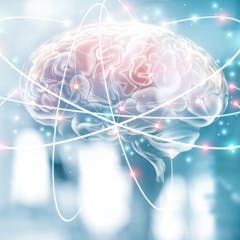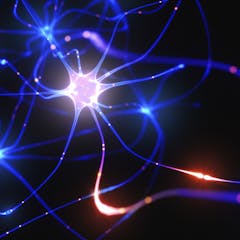
Artículos sobre Neurons
Mostrando 1 - 20 de 97 artículos

Eating right, exercising, playing sports, reading and journaling are just a few of the ways you can keep your brain in top shape.

Studying the human brain is difficult because of its vast and intricate network of neural connections. The fruit fly offers a simpler but similar model that researchers can more easily map.

Our bodies have a dedicated channel for sensing only the very lightest of touches.

Robots often have a hard time navigating through debris, but robots designed based on worms and snakes could move around obstacles faster, thanks to an idea called mechanical intelligence.

Montréal is home to one of the world’s largest brain banks, the Douglas-Bell Canada Brain Bank, where discoveries about different neurological and psychiatric diseases are made.

Neuromorphic computers aim to one day replicate the amazing efficiency of the brain.

Itch-sensing neurons in your skin are intertwined with your immune cells. Counterintuitively, the molecule that connects them triggers responses that both worsen and improve skin conditions.

Change in the brain usually comes with plenty of effort over time. Neuroscientists are working to understand how psychedelic drugs provide a shortcut that seems to rely on existing brain systems.

From dopamine hacking to dopamine detoxes, some people have sought to harness this brain chemical to improve their mood and productivity. But it’s far more complicated than that.

We still don’t know a lot about how the networks of cells in the brain enable conscious experience.

New research on what attracts blood-feasting flies to blue objects could help minimise the impacts of those insects on people and animals.

When fruit flies see other dead fruit flies, their life spans are cut short. Other species also undergo analogous physiological changes when seeing their dead.

TENS machines for period pain are all over social media. But what are they? And do they work?

Pinpointing where memories are stored in the brain and how they are transmitted could provide new targets to treat neurological diseases and serve as models for neuromorphic computing.

Learning new rules requires the suppression of old ones. A better understanding of the brain circuits involved in behavioral adaptation could lead to new ways to treat schizophrenia and bipolar disorder.

Collections of self-organising nanowires behave a lot like the neurons and synapses in our brains, with startling results.

Mirror neurons play a fundamental role in learning by imitation and observation or empathy. This is why we should take them into account when developing new educational tools.

Neuroscientists have typically thought of energy supply to the brain as demand-based. A supply-limited view offers another perspective toward aging and why multitasking can be difficult.

Your thoughts, emotions and behaviours arise from the complex network of electric activity in your brain. But what can we do when we need to tweak it?

Making sure RNA molecules are in the right place at the right time in a cell is critical to development and normal function. Researchers are figuring out exactly how they get to where they need to go.
